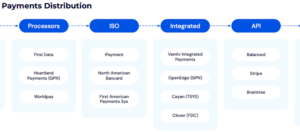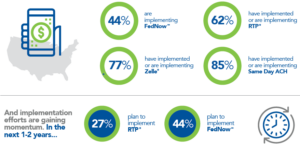Last week at Finovate Fall 2023, MoneyGram CEO Alex Holmes was interviewed by a Forbes reporter, Leo Schwartz, about cryptocurrency and its potential impact on cross-border payments and remittances. The discussion shed light on the complexities and challenges surrounding the adoption of cryptocurrencies in the payments industry.
Holmes began by acknowledging the allure of cryptocurrencies, particularly their promise of instant, fee-free cross-border transactions. However, he emphasized that the reality of cryptocurrency adoption is far more intricate. MoneyGram, a legacy financial services company, finds itself in a unique position, experimenting with cryptocurrencies while remaining skeptical of their ability to revolutionize the payment landscape.
One key point Holmes made was the inherent resilience of traditional banking systems. These systems have historically been designed to safeguard the interests of a nation’s citizens and maintain economic stability. While cryptocurrencies offer exciting prospects, the existing financial infrastructure serves as the backbone of global commerce.
The conventional financial system was never intended for seamless international integration. As a result, global payment flows, whether for consumers, businesses, or banks, often suffer from inefficiencies. The primary focus has historically been on facilitating large-scale transactions, leaving room for improvement in the realm of cross-border payments.
On the topic of crypto transfers and fiat currencies, Holmes said:
“Crypto advocates always point to one killer use case, and that’s cross-border payments and remittances. At some point, however, the crypto transfer has to interface with fiat currencies, and that’s where the friction comes into place.”
He added:
“Through partnerships with Stellar and Circle, we are approaching crypto transfers as an extension of foreign exchange…It works, and it works wonderfully well. Crypto does not have to replace fiat but crypto does have to be an extension of the existing world.”
Visa and Mastercard are also partnering with Circle. Cryptocurrency’s promise lies in its potential to transcend the limitations of traditional banking systems, allowing individuals and businesses to create their own financial networks for seamless cross-border transactions. MoneyGram’s approach has involved establishing a network by partnering with local banks, wallets, and partners worldwide, effectively circumventing the existing system’s inefficiencies.
Despite the excitement surrounding cryptocurrencies, Holmes acknowledged the challenges they present. Interoperability, the ability of different cryptocurrencies and blockchains to work seamlessly together, remains a significant hurdle. While blockchain technology is indeed fast and efficient, the lack of interoperability among different cryptocurrencies complicates the landscape.
The discussion also highlighted regulatory and usability concerns. While cryptocurrencies may offer fee-free transactions within their networks, the process of converting cryptocurrencies into fiat currency for everyday use can incur costs and complications.
At the end of the day, while cryptocurrencies hold promise in the realm of cross-border payments and remittances, they face substantial challenges, including interoperability and regulatory hurdles. MoneyGram, as a legacy financial institution, recognizes the need for innovation but remains cautious about overestimating the immediate transformative power of cryptocurrencies in addressing the complexities of the global payments ecosystem.
Alex Holmes
Holmes is Chairman and CEO of MoneyGram International, leading the next iteration of the MoneyGram journey to leverage its modern, mobile and API-driven platform with a specific focus on building the digital business model of the future. Alex has spearheaded industry-leading efforts to utilize crypto and blockchain technology to change the way money moves across borders. An advocate of social impact, Alex has been instrumental in leading company initiatives focused on empowering others through education and financial inclusion.
Alex joined MoneyGram in 2009 and previously served as both CFO and COO before being named CEO in January 2016. Prior to MoneyGram, Alex spent almost nine years at First Data Corporation where he held a variety of positions, including Chief of Staff to the CEO, Head of Investor Relations, Senior Vice President of Global Sourcing & Strategic Initiatives, and Regional Director of the Benelux for Western Union. He is also a member of the Federal Reserve Bank of New York’s Innovation Advisory Council and part of the Global One chapter of the Young Presidents Organization.
Leo Schwartz
Schwartz is a reporter at Fortune covering the global impact of crypto, regulation, cybercrime, and all things blockchain. He previously worked at Rest of World, covering tech from Mexico City. His work has also appeared in the Washington Post, PBS NewsHour, and The Nation. He graduated with a dual master’s in journalism and Latin American studies from New York University and a bachelor’s from Columbia University.
- SEO Powered Content & PR Distribution. Get Amplified Today.
- PlatoData.Network Vertical Generative Ai. Empower Yourself. Access Here.
- PlatoAiStream. Web3 Intelligence. Knowledge Amplified. Access Here.
- PlatoESG. Carbon, CleanTech, Energy, Environment, Solar, Waste Management. Access Here.
- PlatoHealth. Biotech and Clinical Trials Intelligence. Access Here.
- Source: https://fintechrising.co/cryptocurrency-and-its-potential-impact-on-cross-border-payments/
- :has
- :is
- :not
- :where
- 2009
- 2016
- 7
- a
- ability
- About
- acknowledged
- across
- added
- addressing
- Adoption
- advisory
- advocate
- advocates
- alex
- All
- Allowing
- allure
- almost
- also
- always
- American
- among
- an
- and
- appeared
- approach
- approaching
- ARE
- AS
- At
- Backbone
- Bank
- Banking
- Banks
- BE
- been
- before
- began
- being
- blockchain
- blockchain technology
- blockchains
- borders
- both
- Building
- business
- business model
- businesses
- but
- by
- CAN
- case
- cautious
- ceo
- cfo
- chairman
- challenges
- change
- Chapter
- chief
- Circle
- circumventing
- Citizens
- City
- Coindesk
- COLUMBIA
- comes
- Commerce
- company
- complexities
- Concerns
- Consumers
- conventional
- converting
- coo
- CORPORATION
- Costs
- Council
- covering
- create
- cross-border
- cross-border payments
- crypto
- cryptocurrencies
- cryptocurrency
- currencies
- Currency
- cybercrime
- data
- day
- designed
- different
- digital
- Director
- discussion
- does
- dual
- Economic
- ecosystem
- Education
- effectively
- efficient
- efforts
- emphasized
- empowering
- end
- establishing
- everyday
- Excitement
- exciting
- existing
- experimenting
- extension
- Face
- facilitating
- Fall
- far
- FAST
- Federal
- federal reserve
- Federal Reserve Bank
- Fiat
- fiat currencies
- Fiat currency
- financial
- financial inclusion
- financial infrastructure
- financial institution
- financial services
- financial services company
- financial system
- finds
- First
- Flows
- Focus
- focused
- For
- For Consumers
- Forbes
- foreign
- Fortune
- friction
- from
- future
- Global
- Global Payments
- Have
- he
- head
- Held
- Highlighted
- his
- historically
- hold
- However
- HTML
- HTTPS
- hurdle
- Hurdles
- immediate
- Impact
- improvement
- in
- Including
- inclusion
- indeed
- individuals
- industry
- industry-leading
- inefficiencies
- Infrastructure
- inherent
- initiatives
- Innovation
- instant
- Institution
- instrumental
- integration
- intended
- interests
- Interface
- International
- Interoperability
- interviewed
- into
- intricate
- investor
- involved
- IT
- iteration
- ITS
- itself
- January
- joined
- journalism
- journey
- Key
- killer
- Lack
- landscape
- large-scale
- Latin
- Latin American
- leading
- leaving
- Legacy
- LEO
- Leverage
- lies
- light
- limitations
- local
- LOCAL BANKS
- made
- maintain
- master’s
- May..
- member
- Mexico
- Mexico City
- Mobile
- model
- Modern
- money
- MoneyGram
- more
- moves
- Named
- nation
- Nations
- Need
- network
- networks
- never
- New
- New York
- New York’s
- next
- nine
- of
- offer
- often
- on
- ONE
- or
- organization
- Others
- own
- part
- particularly
- partnering
- partners
- payment
- payments
- PBS
- Place
- platform
- plato
- Plato Data Intelligence
- PlatoData
- Point
- position
- positions
- Post
- potential
- power
- present
- president
- Presidents
- previously
- primary
- Prior
- process
- promise
- prospects
- Reality
- realm
- recognizes
- regional
- Regulation
- regulatory
- relations
- remaining
- remains
- Remittances
- replace
- reporter
- Reserve
- reserve bank
- resilience
- REST
- result
- revolutionize
- Room
- safeguard
- Said
- seamless
- seamlessly
- senior
- served
- serves
- Services
- services company
- shed
- significant
- skeptical
- Social
- Social impact
- some
- Sourcing
- spearheaded
- specific
- spent
- Stability
- Staff
- Stellar
- Strategic
- studies
- substantial
- Surrounding
- system
- Systems
- tech
- Technology
- that
- The
- The Future
- The Landscape
- The Washington Post
- their
- These
- they
- things
- Through
- to
- together
- topic
- traditional
- traditional banking
- Transactions
- transfer
- transfers
- transformative
- union
- unique
- university
- usability
- use
- use case
- utilize
- variety
- vice
- Vice President
- Wallets
- was
- washington
- washington post
- Way..
- we
- week
- WELL
- Western
- western union
- whether
- while
- with
- within
- Work
- worked
- works
- world
- worldwide
- years
- york
- young
- zephyrnet











